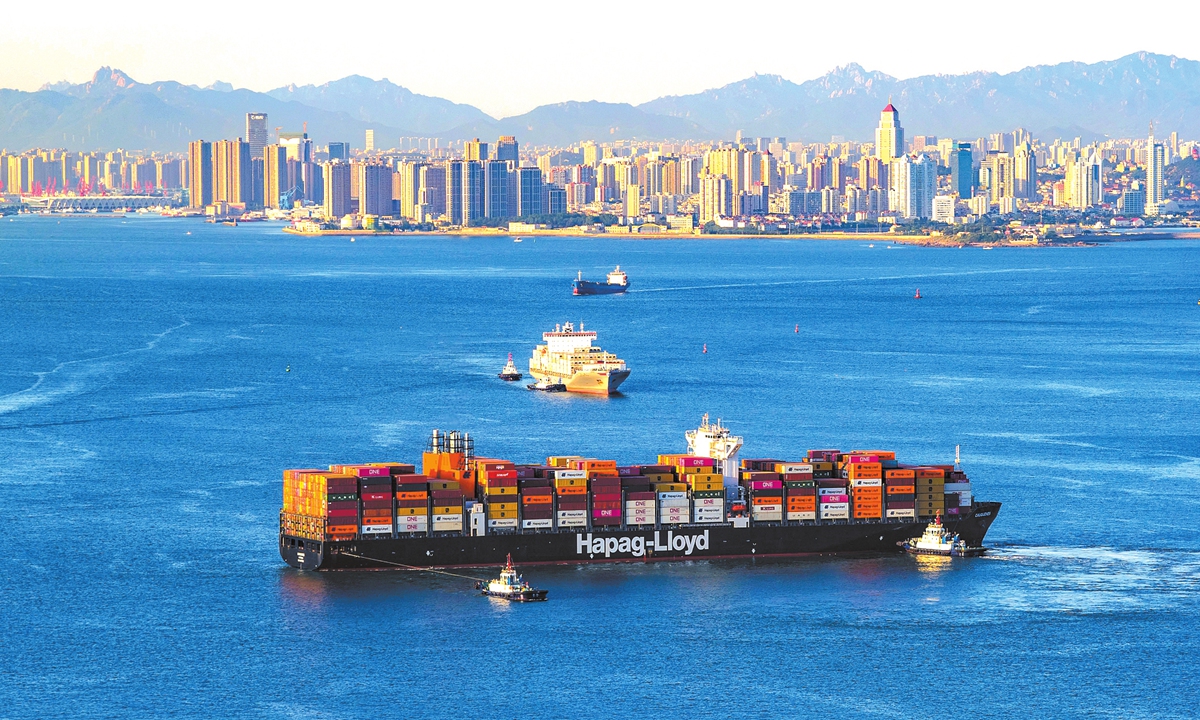
A container ship is seen at the Qingdao port in East China's Shandong Province on June 3, 2025. Photo: VCG
Amid growing uncertainty triggered by shifts in global protectionist tariff policies, China and Brazil have continued to deepen bilateral trade cooperation, with the quality of collaboration steadily improving.
Looking ahead, the two countries hold strong potential and momentum for further cooperation in key areas such as the green and digital economies. As countries in the Global South, the two countries can uphold multilateralism and support open, rules-based trade to counter the challenges posed by deglobalization and rising protectionism.
The uncertainty surrounding US tariffs is not only a challenge but also a wake-up call. It highlights the need for greater resilience in the face of global trade disruptions. Rather than relying too heavily on any single external partner, countries in the Global South should view this moment as an opportunity to strengthen South-South relations. By doing so, countries in the Global South can build more stable supply chains and foster trade among themselves, promoting shared growth and development. Brazil has seen increasingly close trade and economic ties with China. China has maintained its position as Brazil's largest trading partner for many consecutive years. The two economies are highly complementary: Brazil exports agricultural commodities and raw materials, while China supplies manufactured goods. In 2024, their bilateral trade reached $188.17 billion. China's exports to Brazil totaled $72.08 billion, marking a 22-percent increase from the previous year.

Sérgio Queiroz Photo: Courtesy of Sérgio Queiroz
In recent years, China-Brazil cooperation has been upgraded in quality, with trade gradually shifting toward emerging fields. The trade structure is increasingly becoming greener and more digital, effectively promoting the energy transition and new industrialization processes in the Latin American country. The evolving global economy demands innovation, sustainability and value-added production - creating space for the partnership to grow in new directions.
One of the most promising areas for expanding China-Brazil economic ties is the green economy. Chinese companies like BYD are already building electric vehicle production facilities in Brazil, signaling a transition from raw material trade to industrial collaboration.
This not only provides more high-quality jobs in Brazil but also aligns with the country's development goals of producing more complex, high-value goods domestically. Brazilian consumers tend to prefer high-cost goods that are locally made due to ease of maintenance and reliability.
Beyond clean-energy transportation, there is vast potential in solar energy, battery manufacturing and other sectors. Brazil is well-positioned due to its abundant natural resources, while China brings extensive technological expertise. Together, the two countries can build an industrial base for green innovation in the Latin American country.
Another frontier for cooperation is the digital and technological economy. Brazil has a growing ecosystem of software developers and start-ups, while China's technology giants such as Huawei are already present in the Brazilian market. There's great potential for partnerships in artificial intelligence, data infrastructure and smart cities. For instance, China's hardware could be paired with Brazilian software to create integrated, scalable solutions for emerging markets.
The outlook for China's economy remains strong, even under external pressures. Its continued growth - 5.4 percent in the first quarter - is a sign of resilience and long-term vision. Brazil, facing its own development challenges, can learn much from China's approach while also sharing its own experience. The two countries can further deepen economic and trade cooperation and continue to collaborate in areas where mutual benefits can be achieved.
The Brazilian companies most active in the Chinese market are primarily agricultural and mineral exporters. These sectors have established strong trade ties with China and remain confident in the market's potential. However, there is growing interest in expanding beyond these traditional areas. Both countries would benefit from identifying and exploring new sectors for cooperation, which could lead to more diversified and mutually beneficial economic ties.
In a world marked by shifting economic and trade landscapes, Brazil and China can build a model of sustainable, high-value cooperation. The two countries have the resources, the expertise, and most importantly, the shared willingness to innovate and grow together. As global dynamics continue to evolve, deepening this partnership will be crucial for fostering inclusive, long-term development across both nations.
The article was compiled based on an interview with Sérgio Queiroz, a researcher at the Institute for Applied Economic Research (Ipea), on the sidelines of the BRICS Think Tank Symposium at the Renmin University of China. Bizopinion@globaltimes.com.cn
 中文
English
中文
English
 中文
English
中文
English

